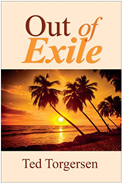
 |
shooting across your sight,
without a word to sound its way,
across the long night it goes"
Writing with a perspective born and molded out of the turbulence of the academic community in the 1960s, the author of these poems and songs combines high concept philosophy with the simple plight of the common folk hero. The end result is a lyrical style that strikes the emotions of the layperson and resonates with the big ideas of the learned. Many of these selections reflect inward and ask hard questions about what weights we accumulate and carry through each season of life. From the emotions of the change-minded 60s and 70s to a more world-weary modern voice, there’s always a strong optimism that proclaims that even though the outside world changes, peace can be found with enough exploration of the inner self and a willingness to find love within and without.
As strong as the characters and voices that fill this songbook are, just as important are the locales and cultural mindsets. From desert ghost towns to island life in the West Indies, the spirit of each environment informs the language used and the direction that the speaker is pulled. In the Caribbean selections, in particular, the subtle linguistic changes of English speakers in that region are carefully captured and presented naturally, illustrating a different way of life motivated by the same desires for love, personal peace, and liberty that drive people around the world in their daily actions. Containing dozens of songs and poems, with the occasional short story and essay thrown in, this collection presents itself simply but promises to leave the reader looking at their own life differently.
When reading through what is largely presented as songs complete with a verse-chorus-verse structure and occasional vocalizations, it can still be hard to pin down a specific voice or range that persists through this extensive volume. The imagery is always strong and vibrant, and there is a frequent sense of loneliness or of facing the inevitable that permeates many of the mournful ballads and mysterious narrators. Yet at the same time, the work isn’t thick and gloomy thanks to the chosen language that resembles folk standards and even southern gospel music. The world may be a confusing and difficult place, and turning introspective can be an even scarier proposition, but life still manages to go on with or without your preparation. That comes across in these writings as more of a relief than an intimidating factor.
The balance between that belief in a utopian world of understanding and the experiences of living a beaten-down lifestyle is tenuous, and each song has a shot at falling on either side. In many cases, it is up to the interpretation of the readers and what they bring into the performance as the audience. There is an emphasis on old-world tradition, spirituality, and mysticism that also comes to terms with a mistrust in the old guard that claims ownership of it, a duality of reaching for the grace of God that leaves you vulnerable to the Devil’s schemes. These ambiguities and personal journeys make the choice of lyrics as the medium so clever because it packs the message so tightly and rhythmically that it could pass itself off as nothing more than a beat to dance to. Yet the trained ear or the questioning soul reads deeper, asks questions, and has to insert itself not only to understand where the author’s point of view is generated but why those words are powerful enough to leave marks. Eclectic, down-to-earth, and unafraid, these are the words of an author with many stories to tell; and while not all of them end happily, they carry the assurance that the sun continues to rise no matter the toll of the previous day.